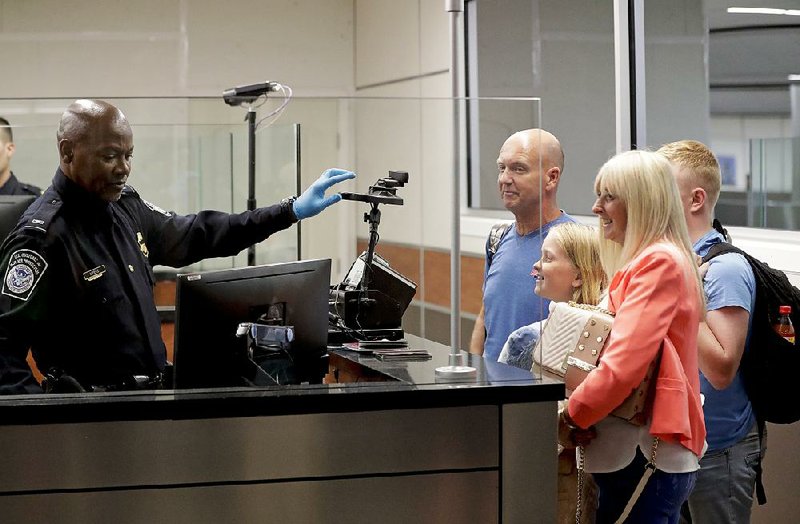ORLANDO, Fla. -- Florida's busiest airport is becoming the first in the nation to require a face scan of passengers on all arriving and departing international flights, including U.S. citizens, according to officials there.
The expected announcement Thursday at Orlando International Airport alarms some privacy advocates who say there are no formal rules in place for handling data gleaned from the scans, nor formal guidelines on what should happen if a passenger is wrongly prevented from boarding.
Airports in Atlanta, Boston, Chicago, Houston, Las Vegas, Miami, New York and Washington already use face scans for some departing international flights, but they don't involve all international travelers at the airports like the program's expansion in Orlando would. The image from the face scan is compared to a Department of Homeland Security biometric database that has images of people who should be on the flight, in order to verify the traveler's identity.
U.S. citizens at these airports can opt out, but the agency "doesn't seem to be doing an adequate job letting Americans know they can opt out," said Harrison Rudolph, an associate at the Center on Privacy & Technology at the Georgetown University Law Center.
U.S. citizens at the Orlando airport will be able to opt out just like at the other airports if they don't want to provide their photograph, Jennifer Gabris, a spokesman for the U.S. Customs and Border Protection said in an email. However, a notice about a possible rule change for the program states that "U.S. citizens may be required to provide photographs upon entering or departing the United States."
The Orlando announcement marks a step up in the scope of the face-scan program, Rudolph said.
"We're not talking about one gate," he said. "We're talking about every international departure gate, which is a huge expansion of the number of people who will be scanned. Errors tend to go up as uses go up."
Orlando International Airport had about 6 million international passengers in the past year.
Rudolph said he has concerns about the face scans' accuracy, since some research shows they are less accurate with members of minority groups, women and children. Researchers say this is because photos used to train the face-scanning software underrepresent minority groups, women and young people.
Two U.S. senators last month sent a letter to the Department of Homeland Security, which is home to the border protection agency, urging that formal rules be implemented before the program is expanded.
"It will also ensure a full vetting of this potentially sweeping program that could impact every American leaving the country by airport," said the letter from Sens. Ed Markey, D-Mass., and Mike Lee, R-Utah.
Meanwhile, the Transportation Security Administration plans to add another item to the gels, liquids and laptops requiring additional scrutiny for U.S.-bound airline passengers -- powders.
Passengers carrying more than 12 ounces of powder -- the size of a regular soda can -- will be subject to additional screening starting June 30, agency spokesman Michael England said. Such items include certain cosmetics, spices and powdered drink mixes.
The policy was enacted partly in response to a foiled bomb plot on an Etihad Airways plane flying to Abu Dhabi in the United Arab Emirates from Sydney in July, England said, noting, "Improvised devices containing powder explosives have always been a concern of TSA's."
To avoid authorities disposing of the powderlike substances, England recommended that passengers place such products inside checked baggage. Powders in carry-on bags will be discarded if screening procedures are unable to effectively resolve them.
The policy shouldn't affect domestic passengers, England said, as the agency has been screening powders, foods and other materials that can obstruct clear images on X-ray machines on domestic flights for about a year.
The heightened security measures follow a series of air-travel regulations implemented in the past two years. In March 2017, the Department of Homeland Security enforced an electronics ban, including laptops, on flights arriving into the U.S. from 10 major airports in the Middle East. The "laptop ban" was later lifted after other security measures were put in place.
Information for this article was contributed by Mike Schneider of The Associated Press and by Mehr Nadeem of Bloomberg News.
Business on 06/22/2018

